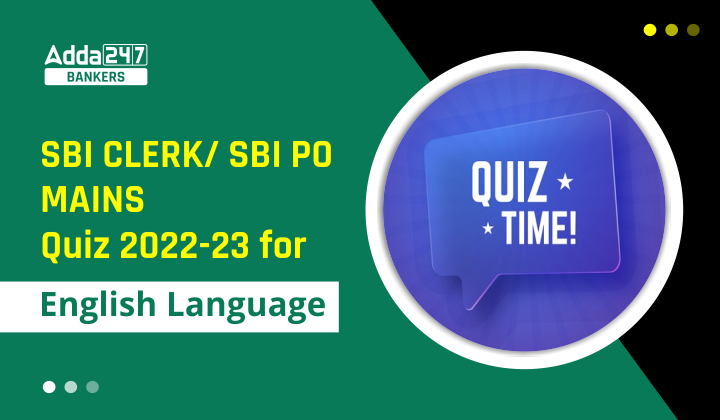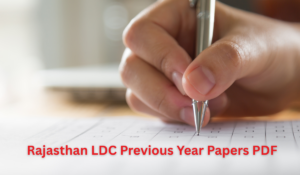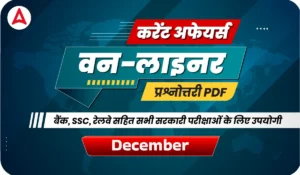Directions (1-6): In the following passage, there are blanks, each of which has been numbered. These numbers are printed below the passage and against each, five words are suggested, one of which fits the blank appropriately. Find out the appropriate word in each case.
Q1. THE government’s move to regulate medical devices by _________________ (1) them all as drugs and bringing them under the purview of the Drugs and Cosmetics Act is a positive step as it is aimed at meeting certain standards of quality and efficacy in these products. The tightened regulation addresses the vacuum felt in the aftermath of Johnson & Johnson’s faulty hip implants. Concerns about patient safety and gaps in the ____________________ (2) of medical device manufacturers as well as doctors arose last year when J&J had had to recall the devices in India after global reports of metal poisoning and high failure rate.
In the absence of norms regarding the quality of a device, doctors shy away from trying products of new companies. With the devices now coming under the lens of the Central Drugs Standard Control Organisation (CDSCO), the domestic medical device industry, that is estimated to be worth billions of rupees, stands to gain. However, the department needs to allay _____________________ (3) regarding not only its ability and __________________ (4) to ensure excellence, but also of slipping into inspector raj. The argument that medical devices, ranging from the comparatively low-risk contraceptives, cotton swabs and thermometers to high-tech implants and radiodiagnosis machines, are engineering items — and not drugs — is logical. The challenge lies in bringing about clear regulatory rules in dealing with the matter at hand; they cannot be the same for such a complex range of micro and macro devices. The new _____________ (5) is likely to shake up local smallscale firms as compliance with standards may prove too costly for them.
While the government’s intention of bringing the devices under scrutiny is good and in keeping with the best practices in the world, the half-baked rules need to be worked upon. Their implementation will be a test for the CDSCO that sadly is accused of collusion with medical experts and pharmaceutical companies. Its commitment towards patient safety must not be compromised. Unregulated devices can play _______________ (6) with the patient’s diagnosis and treatment.
(a) concerted
(b) providing
(c) notifying
(d) segment
(e) mitigating
Q2. THE government’s move to regulate medical devices by _________________ (1) them all as drugs and bringing them under the purview of the Drugs and Cosmetics Act is a positive step as it is aimed at meeting certain standards of quality and efficacy in these products. The tightened regulation addresses the vacuum felt in the aftermath of Johnson & Johnson’s faulty hip implants. Concerns about patient safety and gaps in the ____________________ (2) of medical device manufacturers as well as doctors arose last year when J&J had had to recall the devices in India after global reports of metal poisoning and high failure rate.
In the absence of norms regarding the quality of a device, doctors shy away from trying products of new companies. With the devices now coming under the lens of the Central Drugs Standard Control Organisation (CDSCO), the domestic medical device industry, that is estimated to be worth billions of rupees, stands to gain. However, the department needs to allay _____________________ (3) regarding not only its ability and __________________ (4) to ensure excellence, but also of slipping into inspector raj. The argument that medical devices, ranging from the comparatively low-risk contraceptives, cotton swabs and thermometers to high-tech implants and radiodiagnosis machines, are engineering items — and not drugs — is logical. The challenge lies in bringing about clear regulatory rules in dealing with the matter at hand; they cannot be the same for such a complex range of micro and macro devices. The new _____________ (5) is likely to shake up local smallscale firms as compliance with standards may prove too costly for them.
While the government’s intention of bringing the devices under scrutiny is good and in keeping with the best practices in the world, the half-baked rules need to be worked upon. Their implementation will be a test for the CDSCO that sadly is accused of collusion with medical experts and pharmaceutical companies. Its commitment towards patient safety must not be compromised. Unregulated devices can play _______________ (6) with the patient’s diagnosis and treatment.
(a) preface
(b) dividend
(c) skilful
(d) leading
(e) accountability
Q3. THE government’s move to regulate medical devices by _________________ (1) them all as drugs and bringing them under the purview of the Drugs and Cosmetics Act is a positive step as it is aimed at meeting certain standards of quality and efficacy in these products. The tightened regulation addresses the vacuum felt in the aftermath of Johnson & Johnson’s faulty hip implants. Concerns about patient safety and gaps in the ____________________ (2) of medical device manufacturers as well as doctors arose last year when J&J had had to recall the devices in India after global reports of metal poisoning and high failure rate.
In the absence of norms regarding the quality of a device, doctors shy away from trying products of new companies. With the devices now coming under the lens of the Central Drugs Standard Control Organisation (CDSCO), the domestic medical device industry, that is estimated to be worth billions of rupees, stands to gain. However, the department needs to allay _____________________ (3) regarding not only its ability and __________________ (4) to ensure excellence, but also of slipping into inspector raj. The argument that medical devices, ranging from the comparatively low-risk contraceptives, cotton swabs and thermometers to high-tech implants and radiodiagnosis machines, are engineering items — and not drugs — is logical. The challenge lies in bringing about clear regulatory rules in dealing with the matter at hand; they cannot be the same for such a complex range of micro and macro devices. The new _____________ (5) is likely to shake up local smallscale firms as compliance with standards may prove too costly for them.
While the government’s intention of bringing the devices under scrutiny is good and in keeping with the best practices in the world, the half-baked rules need to be worked upon. Their implementation will be a test for the CDSCO that sadly is accused of collusion with medical experts and pharmaceutical companies. Its commitment towards patient safety must not be compromised. Unregulated devices can play _______________ (6) with the patient’s diagnosis and treatment.
(a) apprehensions
(b) impudence
(c) levied
(d) swift
(e) danger
Q4. THE government’s move to regulate medical devices by _________________ (1) them all as drugs and bringing them under the purview of the Drugs and Cosmetics Act is a positive step as it is aimed at meeting certain standards of quality and efficacy in these products. The tightened regulation addresses the vacuum felt in the aftermath of Johnson & Johnson’s faulty hip implants. Concerns about patient safety and gaps in the ____________________ (2) of medical device manufacturers as well as doctors arose last year when J&J had had to recall the devices in India after global reports of metal poisoning and high failure rate.
In the absence of norms regarding the quality of a device, doctors shy away from trying products of new companies. With the devices now coming under the lens of the Central Drugs Standard Control Organisation (CDSCO), the domestic medical device industry, that is estimated to be worth billions of rupees, stands to gain. However, the department needs to allay _____________________ (3) regarding not only its ability and __________________ (4) to ensure excellence, but also of slipping into inspector raj. The argument that medical devices, ranging from the comparatively low-risk contraceptives, cotton swabs and thermometers to high-tech implants and radiodiagnosis machines, are engineering items — and not drugs — is logical. The challenge lies in bringing about clear regulatory rules in dealing with the matter at hand; they cannot be the same for such a complex range of micro and macro devices. The new _____________ (5) is likely to shake up local smallscale firms as compliance with standards may prove too costly for them.
While the government’s intention of bringing the devices under scrutiny is good and in keeping with the best practices in the world, the half-baked rules need to be worked upon. Their implementation will be a test for the CDSCO that sadly is accused of collusion with medical experts and pharmaceutical companies. Its commitment towards patient safety must not be compromised. Unregulated devices can play _______________ (6) with the patient’s diagnosis and treatment.
(a) claim
(b) forest
(c) device
(d) competence
(e) surrender
Q5. THE government’s move to regulate medical devices by _________________ (1) them all as drugs and bringing them under the purview of the Drugs and Cosmetics Act is a positive step as it is aimed at meeting certain standards of quality and efficacy in these products. The tightened regulation addresses the vacuum felt in the aftermath of Johnson & Johnson’s faulty hip implants. Concerns about patient safety and gaps in the ____________________ (2) of medical device manufacturers as well as doctors arose last year when J&J had had to recall the devices in India after global reports of metal poisoning and high failure rate.
In the absence of norms regarding the quality of a device, doctors shy away from trying products of new companies. With the devices now coming under the lens of the Central Drugs Standard Control Organisation (CDSCO), the domestic medical device industry, that is estimated to be worth billions of rupees, stands to gain. However, the department needs to allay _____________________ (3) regarding not only its ability and __________________ (4) to ensure excellence, but also of slipping into inspector raj. The argument that medical devices, ranging from the comparatively low-risk contraceptives, cotton swabs and thermometers to high-tech implants and radiodiagnosis machines, are engineering items — and not drugs — is logical. The challenge lies in bringing about clear regulatory rules in dealing with the matter at hand; they cannot be the same for such a complex range of micro and macro devices. The new _____________ (5) is likely to shake up local smallscale firms as compliance with standards may prove too costly for them.
While the government’s intention of bringing the devices under scrutiny is good and in keeping with the best practices in the world, the half-baked rules need to be worked upon. Their implementation will be a test for the CDSCO that sadly is accused of collusion with medical experts and pharmaceutical companies. Its commitment towards patient safety must not be compromised. Unregulated devices can play _______________ (6) with the patient’s diagnosis and treatment.
(a) beginning
(b) regime
(c) diligent
(d) reconsidering
(e) lenient
Q6. THE government’s move to regulate medical devices by _________________ (1) them all as drugs and bringing them under the purview of the Drugs and Cosmetics Act is a positive step as it is aimed at meeting certain standards of quality and efficacy in these products. The tightened regulation addresses the vacuum felt in the aftermath of Johnson & Johnson’s faulty hip implants. Concerns about patient safety and gaps in the ____________________ (2) of medical device manufacturers as well as doctors arose last year when J&J had had to recall the devices in India after global reports of metal poisoning and high failure rate.
In the absence of norms regarding the quality of a device, doctors shy away from trying products of new companies. With the devices now coming under the lens of the Central Drugs Standard Control Organisation (CDSCO), the domestic medical device industry, that is estimated to be worth billions of rupees, stands to gain. However, the department needs to allay _____________________ (3) regarding not only its ability and __________________ (4) to ensure excellence, but also of slipping into inspector raj. The argument that medical devices, ranging from the comparatively low-risk contraceptives, cotton swabs and thermometers to high-tech implants and radiodiagnosis machines, are engineering items — and not drugs — is logical. The challenge lies in bringing about clear regulatory rules in dealing with the matter at hand; they cannot be the same for such a complex range of micro and macro devices. The new _____________ (5) is likely to shake up local smallscale firms as compliance with standards may prove too costly for them.
While the government’s intention of bringing the devices under scrutiny is good and in keeping with the best practices in the world, the half-baked rules need to be worked upon. Their implementation will be a test for the CDSCO that sadly is accused of collusion with medical experts and pharmaceutical companies. Its commitment towards patient safety must not be compromised. Unregulated devices can play _______________ (6) with the patient’s diagnosis and treatment.
(a) bureau
(b) imposed
(c) risk
(d) active
(e) havoc
Directions (7-11): In the following questions two columns are given containing three sentences/phrases each. In first column, sentences/phrases are A, B and C and in the second column the sentences/phrases are D, E and F. A sentence/phrase from the first column may or may not connect with another sentence/phrase from the second column to make a grammatically and contextually correct sentence. Each question has five options, four of which display the sequence(s) in which the sentences/phrases can be joined to form a grammatically and contextually correct sentence. If none of the options given forms a correct sentence after combination, mark (e), i.e. “None of these” as your answer.
Q7.
Column (1):
(A) THE government’s move to regulate medical devices by notifying them all as drugs and bringing them
(B) The insurance regulator is responsible for protecting the policyholders and the markets
(C) The Reserve Bank of India in its latest policy review
Column (2):
(D) under the purview of the Drugs and Cosmetics Act is a positive step.
(E) had stated that there was policy space for future action.
(F) regulator will have to ensure investor protection by way of disclosures.
(a)A-D
(b)B-E
(c)C-F
(d)All of the above
(e)None of these
Q8.
Column (1):
(A) Under Prime Minister Narendra Modi India has taken a strong turn
(B) There is no doubt that Kejriwal would like to spread his wings wherever possible
(C) We have placed a strong emphasis to expand city gas distribution (CGD) networks
Column (2):
(D) in the energy road map towards renewables and rebalancing the energy mix.
(E) and he will seize every opportunity to strengthen his party at the ground level.
(F) diversify the geographies to source gas.
(a)A-D
(b)B-E
(c)C-F
(d)Both (a) & (b)
(e) All of the above
Q9.
Column (1):
(A) More than 800 such businesses have sprouted around the country
(B) China is confident the coronavirus epidemic will be over soon and
(C) With the Congress drawing a cipher in the Delhi elections, it is time for its top leadership
Column (2):
(D) greater negotiating leverage over each small operator than it does with larger delivery partners like UPS, FedEx and the U.S. Postal Service.
(E) it will be difficult for the central bank of India to cut policy rates further in the near term.
(F) to realise that the task of defeating the BJP cannot be outsourced.
(a)A-E
(b)B-D
(c)C-F
(d)All of the above
(e)None of these
Q10.
Column (1):
(A) The Stakhanovite Naidu’s biggest challenge came when a polluting
(B) Some patients also showed symptoms associated with common cold
(C) The new coronavirus has restricted millions of Chinese people to their
Column (2):
(D) factory was operating illegally from the colony and was posing a health risk.
(E) homes and towns, and now old bank notes are being quarantined.
(F) or flu such sore throat but those were small in numbers.
(a)A-D
(b)B-E
(c)C-F
(d)All of the above
(e)None of these
Q11.
Column (1):
(A) Global rating agency S&P has reaffirmed India’s sovereign ratings,
(B) The top court had ordered telecom companies to pay
(C) Respective boards of the three companies have already
Column (2):
(D) noting that growth will gradually recover over two-three years.
(E) given their in-principal approvals for the merger.
(F) AGR dues of over ₹1 trillion to DoT by 23 January.
(a) A-D
(b) B-E
(c) C-F
(d) All of the above
(e) None of these
Directions (12-15): In each of the questions given below a sentence is given which is then divided into five parts out of which last part (E) given in bold is correct. There are errors in some parts of the sentence out of which only one part is correct. You must choose the part as your answer.
Q12. The market condition when (A)/good and services are (B)/ not free available(C) /and thus the prices is (D)/ relatively high in seller’s market. (E)
(a)The market condition when
(b)good and services are
(c)not free available
(d)and thus the prices is
(e)All are incorrect
Q13. The Head of Government (A)/of countries (B) /which are member (C) /of the Commonwealth meet for the (D) /awareness on social issues.(E)
(a)The head of Government
(b)of countries
(c)which are member
(d) of the Commonwealth meet for the
(e)All are incorrect
Q14. New knowledge and new ways (A)/ for understanding the world (B)/, of good or bad(C)/, have always been a (D)/part of every society. (E)
(a)New knowledge and new ways
(b)for understanding the world
(c)of good or bad
(d)have always been
(e)All are incorrect
Q15. The Partition and the (A) /bloodletting who accompanied (B) /our Independence take up(C)/ many of the(D) /energy of our founders.(E)
(a)The partition and the
(b)bloodletting who accompanied
(c)our Independence take up
(d)many of the
(e)All are incorrect
Solutions
S1. Ans. (c)
Sol. ‘notifying’ fits in the blank (1) to make a grammatically and contextually correct sentence. Hence, option (c) is the right answer choice.
S2. Ans. (e)
Sol. ‘accountability’ fits in the blank (2) to make a grammatically and contextually correct sentence. Hence, option (e) is the right answer choice.
S3. Ans. (a)
Sol. ‘apprehensions’ fits in the blank (3) to make a grammatically and contextually correct sentence. Hence, option (a) is the right answer choice.
S4. Ans. (d)
Sol. ‘competence’ fits in the blank (4) to make a grammatically and contextually correct sentence. Hence, option (d) is the right answer choice.
S5. Ans. (b)
Sol. ‘regime’ fits in the blank (5) to make a grammatically and contextually correct sentence. Hence, option (b) is the right answer choice.
S6. Ans. (e)
Sol. ‘havoc’ fits in the blank (6) to make a grammatically and contextually correct sentence. Hence, option (e) is the right answer choice.
S7. Ans. (a)
Sol. Here, A-D can be joined to form a grammatically and contextually correct sentence. The sentence thus formed:
A-D: THE government’s move to regulate medical devices by notifying them all as drugs and bringing them under the purview of the Drugs and Cosmetics Act is a positive step.
S8. Ans. (d)
Sol. Here, A-D & B-E can be joined to form a grammatically and contextually correct sentence. The sentence thus formed:
A-D: Under Prime Minister Narendra Modi India has taken a strong turn in the energy road map towards renewables and rebalancing the energy mix.
B-E: There is no doubt that Kejriwal would like to spread his wings wherever possible and he will seize every opportunity to strengthen his party at the ground level.
S9. Ans. (c)
Sol. Here, C-F can be joined to form a grammatically and contextually correct sentence. The sentence thus formed:
C-F: With the Congress drawing a cipher in the Delhi elections, it is time for its top leadership to realise that the task of defeating the BJP cannot be outsourced.
S10. Ans. (a)
Sol. Here, A-D can be joined to form a grammatically and contextually correct sentence. The sentence thus formed:
A-D: The Stakhanovite Naidu’s biggest challenge came when a polluting factory was operating illegally from the colony and was posing a health risk.
S11. Ans. (a)
Sol. Here, A-D can be joined to form a grammatically and contextually correct sentence. The sentence thus formed:
A-D: Global rating agency S&P has reaffirmed India’s sovereign ratings, noting that growth will gradually recover over two-three years.
S12. Ans. (a)
Sol. There are errors in parts (B), (C) and (D).
Part (A) is free of error.
The correction is as follows:
Part (B) must be goods and services.
Part (C) must be not freely available.
Part (D) must be and thus the prices are.
S13. Ans. (d)
Sol. Only part (D) of the sentence is correct. Parts (A), (B) and (C) are erroneous.
In the part (A), ‘the Heads of Government’ must be used as there is more than one country.
In the part (B), ‘of the countries’ must be used. The usage of article ‘the’ is required.
In the part (C), ‘which are members’ must be used because we are not talking about a singular country instead a plural noun that is, countries so its members.
S14. Ans.(a)
Sol. Only part (A) is correct.
In the part (B) the preposition ‘for’ must be replaced by ‘of’ whereas in the part (C) the preposition ‘of’ must be replaced by ‘for’. In the part (D), ‘have’ must be replaced with ‘has’ since this verb takes the form of new knowledge and new ways.
S15. Ans. (a)
Sol. Except part (A), all other options are erroneous.
Since the partition and bloodletting are uncountable nouns it will take a conjunction ‘that’ and not ‘who’ in part (B).
Furthermore in the part (C), ‘our Independence took up’. This is so because these events have already happened in the past.
In the part (D), ‘many of the must’ be replaced by ‘much of the’.





 Rajasthan LDC Previous Year Question Pap...
Rajasthan LDC Previous Year Question Pap...
 Bank of Baroda (BOB) Chaprasi (Peon) Adm...
Bank of Baroda (BOB) Chaprasi (Peon) Adm...
 करेंट अफेयर्स वन-लाइनर दिसंबर 2025 प्रश्...
करेंट अफेयर्स वन-लाइनर दिसंबर 2025 प्रश्...










